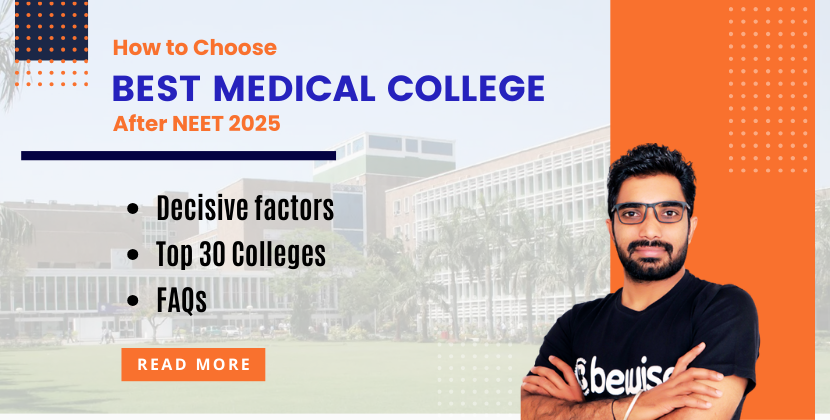Choosing the right medical college after qualifying NEET is a pivotal decision in a medical student's career. With a vast landscape that includes the best medical colleges in India, renowned global institutions, and specialized programs like BDS and BAMS, it's essential for aspirants to evaluate their options methodically. This guide provides an in-depth look at what matters most when selecting a medical college—be it in India or anywhere in the world.
Understanding NEET and Its Importance in College Selection
The National Eligibility cum Entrance Test (NEET) serves as the unified gateway to undergraduate medical education in India. A student’s NEET performance determines eligibility for MBBS, BDS, BAMS, and allied programs across both government and private institutions. A higher NEET score increases the probability of admission into the best government medical colleges in India, such as AIIMS and JIPMER, while those with moderate scores may consider well-reputed private medical institutions or even international options. Students interested in exploring complete syllabus for NEET 2026 Exam can visit our NEET 2026 Syllabus page.
Factors to Consider Before Choosing a Medical College
Choosing a medical college is one of the most important decisions in a student's academic and professional life. With numerous options available, it’s essential to evaluate various factors that directly influence the quality of education and future career opportunities. From accreditation and infrastructure to clinical exposure and fee structure, each element plays a vital role in shaping a successful medical journey. Understanding these factors helps students select the institution that best aligns with their goals and aspirations.
Type of Institution | Average Annual Fee |
Government Medical Colleges | ₹10,000 – ₹1,00,000 |
Semi - Government Medical Colleges | ₹50,000 – ₹5,00,000 |
Private Medical Colleges | ₹5,00,000 – ₹30,00,000 |
Final Checklist Before Making the Decision
Selecting the right medical college is a critical milestone in a student’s academic journey. As the counseling phase approaches, it becomes essential to ask the right questions and evaluate all key factors before making a final decision. This checklist is designed to guide students in addressing important aspects such as accreditation, campus infrastructure, faculty support, and clinical exposure. By knowing what to ask during college counseling, students can make a well-informed and confident choice for their future in medicine. Students should inquire about:
Decision-Making Matrix for Comparing Colleges
When faced with multiple college options, a structured approach can simplify the decision-making process. A weighted decision-making matrix allows students to objectively compare institutions based on key criteria that matter most to them. By assigning weights to factors such as accreditation, faculty quality, clinical exposure, location, fee structure, and infrastructure, students can evaluate each college on a common scale. A weighted matrix helps compare multiple options:
Criteria | Weight | College A | College B | College C |
NEET Cutoff | 20% | 4 | 5 | 3 |
Clinical Exposure | 25% | 5 | 3 | 4 |
Faculty & Infrastructure | 20% | 4 | 4 | 5 |
Location | 15% | 3 | 5 | 4 |
Campus & Extra Curricular | 5% | 5 | 4 | 3 |
Establishment Year | 15% | 4 | 5 | 3 |
Overall Score | 4.15 | 4.25 | 3.8 |
S.No. | Allotted Institute |
1 | AIIMS, New Delhi |
2 | Maulana Azad Medical College, New Delhi |
3 | Vardhman Mahavir Medical College and Safdarjung Hospital New Delhi |
4 | University College of Medical Sciences, New Delhi |
5 | JIPMER PUDUCHERRY , Puducherry |
6 | Atal Bihari Vajpayee Institute of Medical Sciences & DR RML HOSPITAL, NEW DELHI |
7 | GOVERNMENT MEDICAL COLLEGE AND HOSPITAL, CHANDIGARH |
8 | Lady Hardinge Medical College, New Delhi |
9 | AIIMS, Bhubaneswar |
10 | AIIMS, Bhopal |
11 | AIIMS, Jodhpur |
12 | Dr. B.S.A. Medical College, Delhi |
13 | SETH G.S. MEDICAL COLLEGE, MUMBAI |
14 | B.J. MEDICAL COLLEGE, AHMEDABAD |
15 | S.M.S. MEDICAL COLLEGE, JAIPUR |
16 | MADRAS MEDICAL COLLEGE, CHENNAI |
17 | AIIMS, Rishikesh |
18 | INST. OF MED. SCIENCES, BHU,VARANASI |
19 | NDMC Medical College, Delhi |
20 | AIIMS, Raipur |
21 | KGMC, LUCKNOW |
22 | MEDICAL COLLEGE, KOLKATA |
23 | AIIMS, Nagpur |
24 | BAHIRAMJEE JIJIBHAI MEDICAL COLLGE, PUNE |
25 | Bangalore Medical College and Research Institute, Karnataka |
26 | AIIMS, Patna |
27 | AIIMS Bathinda |
28 | GOVT. MEDICAL COLLEGE, KOZHIKODE |
29 | RUHS College of Medical Sciences, Jaipur |
30 | GRANT MEDICAL COLL & SIR J.J.HOSP, MUMBAI, |
FAQs About Choosing the Best Medical College After NEET
1. What are the best medical colleges in India for MBBS?
Institutions like AIIMS Delhi, MAMC New Delhi, JIPMER Puducherry, IMS BHU and AFMC Pune are some of the renowned medical colleges for excellence in education and clinical practice.
3. What is the difference between government and private medical colleges?
Government colleges offer affordability and competitive exposure, while private colleges provide advanced infrastructure and global collaborations but fees of private colleges is very high as compared to Government Medical Colleges.
4. Can NEET-qualified students study abroad?
Yes, many best medical universities in the world accept NEET scores, especially in Russia, the Philippines, and Eastern Europe.
5. Which are the best colleges for Dental and Ayurvedic courses?
Maulana Azad Institute of Dental Sciences and Banaras Hindu University (BHU) are top choices for BDS and BAMS, respectively.
For aspiring doctors, selecting the right medical college after NEET is not just about securing a seat—it’s about laying the foundation for a lifelong journey in healthcare. Beyond entrance exam scores, students must consider long-term factors like college reputation, accreditation, academic exposure, clinical training, and support facilities. Each of these elements contributes significantly to shaping one’s medical education and future opportunities.
Whether one is targeting the best medical colleges in India, top-tier private institutions, or even the best medical schools in the world, making a well-researched and thoughtful decision is crucial. This blog highlighted key aspects such as infrastructure, teaching methods, specializations, fee structures, admission processes, and campus life—ensuring students and parents are equipped with the right questions and considerations before finalizing their choice.
In the end, a well-informed decision empowers students to not only thrive academically but also grow as compassionate, competent, and confident medical professionals.

BeWise Classes











Leave a Comment